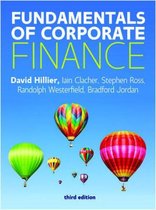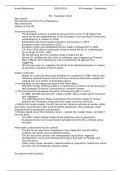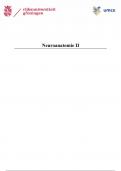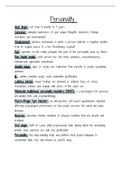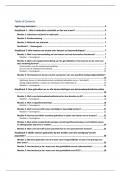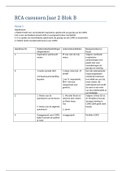CH.6. Q.1: Bond Valuation 15p
settlement date 1/1/2010
maturity date 1/1/2040
coupon rate 2%
YTM 2.20%
FV (%) 100 £ 100,000 excel does not allow 1000… Always
semi-annual 2
Price (%) 95.6247
Price $ £ 95,624.70 (Price%/FV%)* FV $
CH.7 Question 2: Equity Valuation 15p
XYZ plc is expected to pay the following dividends
T0 T1 T2 T3
Dividends 24 € 20 € 18 €
constant growth rate 5%
RRR 8%
current share price? P0?
P5 = D5(1+g)/(r-g)
p0 = D/(1+DR)+D/((1+DR)^2)+D/((1+DR)^3)+D/((1+DR)^4)+D/((1+DR)^5)+P5/((1+DR)^5)
p5 350.00 €
p0 308.96 €
CH.11&12 Question 3: Return & Risk 20p
Rate of returns if state occurs
Scenario prob. Equity A Equity B
Boom 0.25 0.35 0.45
Good 0.35 0.15 0.12
Poor 0.4 0.05 -0.15
, Weights 0.25 0.55
A. Portfolio return (PR) 11.65%
portfolio variance 0.018 sumproduct(prob;(PR-PERs)^2)
portfolio SD 13.54% sqrt Pvariance
B.
expected T-bill rate 1.65%
portfolio's expected risk Premium?* 10.00% PR - T-bill rate
*excess return as compensation
for taking extra risk
CH.16 Question 4: Stock Dividends 15 p
stock dividend 10% (1+0.10)
sahre € 35.00
par value € 1.00
Equity accounts (now)
Ordinary shares (1 eur par value) € 1,000,000.00
Capital Surplus € 1,500,000.00
Retained earnings € 5,500,000.00
Total Owner's Equity € 8,000,000.00
Initial share outstanding 1,000,000.00
What effects on the equity accounts
will the distribution of the stock dividend have?
new shares outstanding 1,100,000
ordinary shares € 1,100,000.00 (*1 euro pra value)
new shares issued 100,000
capital surplus for new shares € 3,400,000.00
Capital surplus € 4,900,000.00 after issuing new shares you get…
Total market value of new shares 3500000
RE € 2,000,000.00
The new equity portion of the balance sheet will look like this:
Ordinary shares (1 eur par value) € 1,100,000.00
Capital Surplus € 4,900,000.00
Retained earnings € 2,000,000.00
Total Owner's Equity € 8,000,000.00
CH.18 Question 5: Exchange Market 15p
, Spot rate Kr/€ 10.65
macroeconomic data :
Eurozone Norway
Interest rate (per annum) 2% 4%
Inflation rate (per annum) 1.50% 2%
A. What is the exact real rate of return in Norway and eurozone?
(1+n) = (1+r) × (1+inf) is the same formula as Fisher Effect.
r = ((1+n)/(1+inf))-1 real interest rate rrr:
rrr eurozone 0.49%
rrr Norway 1.96%
B. What is the expected one-year spot rate based on the Purchasing Power Parity (PPP)?
St+1 = St ((1+infnr)/(1+infeu))
Expected One-Year Spot Rate (Using PPP):
st + 1 = St * ((1+inf norw)/(1+inf eur)) 10.70246 Kr/€
C. What would you expect the one-year forward rate to be if no immediate arbitrage opportuniti
(use real interest rate calculated in part a)
Ft+1 = St ((1+rnr)/(1+reu))
One-Year Forward Rate (Using Interest Rate Parity): 10.8056
Question 6: Merger and Acquisition 20p
Consider the following pre-merger information about two Dutch firms:
Firm A Firm B
Total earnings (€) 1100 400
Shares outstanding 500 150
Price per share (€) 50 20
Assume that firm A acquires firm B via an exchange of equity
share price of B's equity € 23.00
a. What is the cost of the acquisition?
b. How many shares should firm A offer to buy firm B?
c. After the merger, what is the shares outstanding of firm A?
, d. What will the earnings per share (EPS) of firm A be after the merger?
e. What will the price–earnings (P/E) ratio of the
post-merger firm be if the market analyses the transaction correctly?

